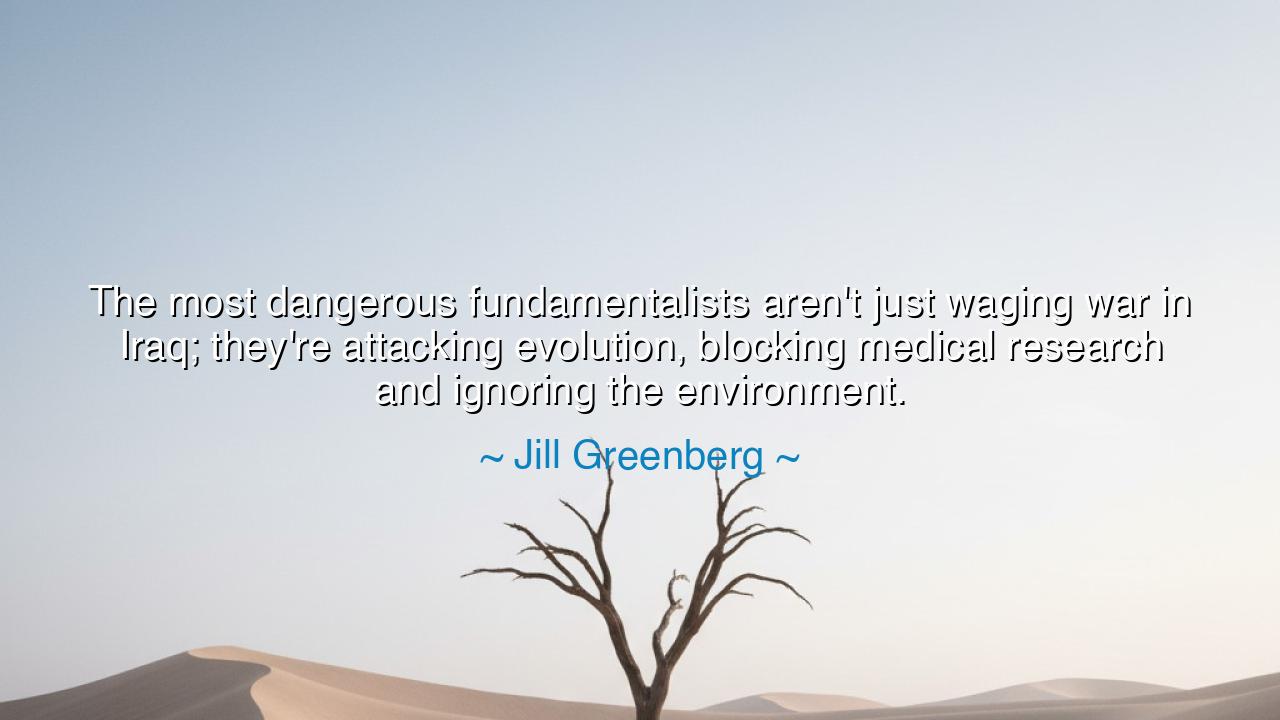
The most dangerous fundamentalists aren't just waging war in
The most dangerous fundamentalists aren't just waging war in Iraq; they're attacking evolution, blocking medical research and ignoring the environment.






The words of Jill Greenberg—“The most dangerous fundamentalists aren't just waging war in Iraq; they're attacking evolution, blocking medical research and ignoring the environment”—are not the idle musings of a moment, but the cry of a prophet who sees beyond the clash of weapons to the deeper wars that threaten the future of humankind. Her voice reminds us that the battlefield is not only in distant lands, but in the realm of knowledge, in the halls of science, and in the fragile garden of the earth itself. These dangers are subtle yet profound, for they do not merely wound the body, but endanger the very foundation of progress, of survival, of life itself.
The ancients often spoke of enemies who came with swords and chariots, but the greater threat has always been blindness of the spirit, a refusal to see truth even when it shines brightly before our eyes. In Greenberg’s words, the fundamentalists she names are not only those who march with weapons, but those who wage a quieter war: against reason, against discovery, against the stewardship of creation. Such wars are insidious, for they do not make noise on the battlefield, yet their toll is measured in generations lost, diseases uncured, and worlds left barren.
Consider the story of Galileo Galilei, who in the seventeenth century dared to look through his telescope and proclaim that the Earth was not the center of the universe. The fundamentalists of his age silenced him, forced him to recant, and consigned his truth to secrecy. Yet time vindicated him. The lesson is clear: to attack evolution or deny the discoveries of science is to repeat the errors of history, chaining humanity to ignorance when the keys of knowledge lie ready in our hands.
To block medical research is to leave countless lives vulnerable to suffering. Imagine a world where the discovery of vaccines, of antibiotics, of modern surgery, had been stifled by those fearful of change. Polio would still paralyze children, infections would still claim lives from the smallest wound, and childbirth would remain a perilous crossing. When Greenberg warns us of those who obstruct such research, she speaks not of abstractions, but of lives weighed in the balance—lives that could be saved, yet are left to darkness by the willful closing of eyes.
And to ignore the environment is to strike at the very breath of our descendants. The ancients understood the earth as mother, the rivers as lifeblood, the forests as guardians. But in our age, too many treat these sacred gifts as if they were endless, plundering without thought. We know the ice melts, the seas rise, the forests burn, and yet still there are those who scoff, who turn away, who deny. This is perhaps the gravest of wars, for it is waged not against one people but against all generations yet unborn.
The lesson for us is heavy with responsibility: do not be seduced by the comfort of denial, nor lulled into silence when truth is endangered. Speak for science, for discovery, for the earth itself. Honor those who labor in research, who strive to heal, who uncover the mysteries of life. Resist those who cloak ignorance in piety or profit. The battle Greenberg names is not far from us; it is here, in our schools, our legislatures, our communities, and even in our homes.
Practical action is within the reach of all: support the teaching of evolution, for it reveals our place in the tapestry of life. Advocate for medical research, for it holds the cure to the suffering of many. Live with reverence for the environment, making choices that honor the earth rather than consume it. And above all, challenge ignorance wherever it arises, not with cruelty but with courage, with knowledge, with unyielding resolve. For each small act of truth is a stone laid in the fortress of wisdom, protecting humanity from the storms of folly.
So let Jill Greenberg’s warning be taken as both trumpet and torch. A trumpet, to awaken us from slumber; a torch, to guide us through the shadows of denial and destruction. For the wars of guns and bombs may one day cease, but the war against truth will endure unless each of us takes our place in defense of knowledge, of healing, and of the sacred earth. Let us stand as guardians, not only for ourselves, but for every generation yet to come.






AAdministratorAdministrator
Welcome, honored guests. Please leave a comment, we will respond soon